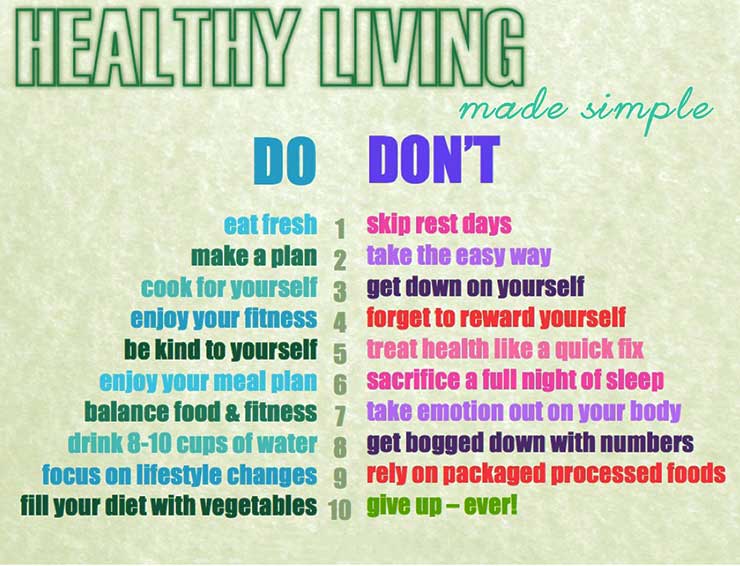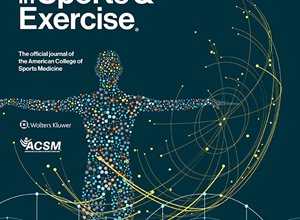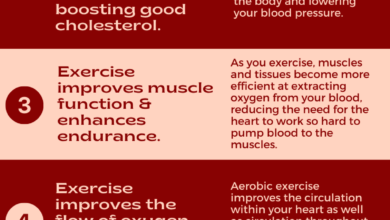Do And Don’Ts of Healthy Living
Healthy living is important for everyone. It can help you feel better and live longer.
But how do you know what to do and what to avoid? A healthy lifestyle can be simple if you follow some basic rules. From eating the right foods to getting enough sleep, small changes can make a big difference.
On the flip side, certain habits can harm your health. It’s all about making smart choices and staying informed. In this blog post, we will explore the essential do’s and don’ts of healthy living. This guide will help you understand the best practices and common pitfalls. Let’s start your journey to better health today!

Credit: www.pinterest.com
Balanced Diet
Hey there! Eating right is super important for a healthy life. And guess what? A balanced diet is key to feeling great and staying strong. Let’s dive into what you should and shouldn’t do when it comes to your diet. We’ll keep it simple and easy to understand.
Nutrient-rich Foods
First up, let’s talk about nutrient-rich foods. These are foods that give your body lots of vitamins and minerals. Think of them as the superstars of your diet.
- Fruits and vegetables: They are packed with vitamins. Try to eat a variety of colors. Each color gives different nutrients.
- Whole grains: Foods like brown rice, oats, and whole wheat bread are great. They have more fiber and keep you full longer.
- Lean proteins: Chicken, fish, beans, and nuts are good choices. They help build muscles and repair tissues.
- Dairy or alternatives: Milk, cheese, and yogurt give you calcium. If you are lactose intolerant, try almond or soy milk.
Here’s a quick example: My friend Sarah started eating more fruits and vegetables last year. She noticed she had more energy and felt happier. Simple changes can make a big difference!
Avoiding Processed Foods
Now, let’s talk about foods to avoid. Processed foods are not our friends. They often have too much sugar, salt, and unhealthy fats.
- Sugary drinks: Sodas and energy drinks have lots of sugar. Choose water or natural fruit juices instead.
- Fast food: Burgers and fries taste good but are high in calories. Try making homemade versions. They are healthier.
- Packaged snacks: Chips and cookies are convenient but unhealthy. Snack on fruits or nuts instead.
- Processed meats: Sausages and hot dogs have lots of preservatives. Opt for fresh meat or plant-based proteins.
Remember, it’s all about balance. You don’t have to give up your favorite treats completely. Just enjoy them in moderation. For example, I love chocolate, but now I eat a small piece once in a while instead of a whole bar.
So, there you have it! Focus on nutrient-rich foods and avoid processed ones. Your body will thank you. Stay healthy and happy!

Credit: x.com
Regular Exercise
Hey friends, today we are diving into a super important topic for healthy living: Regular Exercise. We all know exercise is good for us, but what kind should you do? How can you stick to it? Let’s break it down together and make it easy to understand and follow.
Types Of Exercise
First, let’s talk about the different types of exercise. Not all exercises are the same, and each type has its own benefits. Here are the main categories:
- Cardio: This includes activities like walking, running, cycling, and swimming. It helps your heart and lungs stay healthy.
- Strength Training: Lifting weights or doing body-weight exercises like push-ups. This helps build muscle and bone strength.
- Flexibility: Stretching exercises like yoga. They help keep your muscles flexible and reduce the risk of injury.
- Balance: Exercises like tai chi or simple balance drills. These are especially important as we get older to prevent falls.
I remember when I first started running. It was tough! But over time, I noticed I had more energy and felt better overall.
Consistency Tips
Now, let’s talk about how to be consistent with your exercise routine. It’s easy to start, but sticking with it can be hard. Here are some tips to help you stay on track:
- Set Realistic Goals: Start small. Maybe aim for 10 minutes a day. Gradually increase as you get more comfortable.
- Create a Schedule: Plan your workouts at a time that works best for you. Maybe early morning or right after work.
- Find a Buddy: Working out with a friend can make exercise more fun and keep you accountable.
- Mix It Up: Try different activities to keep things interesting. One day you could run, the next day you could do yoga.
- Track Your Progress: Keep a simple log of your workouts. Seeing your progress can be a great motivator.
I once joined a group fitness class. It was a great way to meet new people and stay motivated. Plus, it made exercising more fun!
Remember, the key to healthy living through exercise is to find what you enjoy and stick with it. It doesn’t have to be complicated. Just move your body regularly and you’ll see the benefits.
Adequate Sleep
Getting enough sleep is essential for healthy living. Avoid late-night screen time and caffeine. Establish a regular sleep schedule for better rest.
Hey friends, today we’re diving into a crucial aspect of healthy living: Adequate Sleep. Getting enough sleep is just as important as eating healthy and exercising. It keeps your brain sharp and your body strong. But how do you ensure you’re getting enough rest? And what happens when you don’t? Let’s break it down.
Sleep Hygiene
Good sleep hygiene is all about creating the right environment and habits for sound sleep. Think of it like setting the stage for a perfect night’s rest. Here are some simple tips:
- Stick to a sleep schedule. Go to bed and wake up at the same time every day.
- Keep your bedroom cool, quiet, and dark.
- Avoid heavy meals, caffeine, and alcohol before bed.
- Make your bed a place for sleep only. No working or watching TV.
- Wind down with a relaxing routine. Read a book or take a warm bath.
For instance, I used to struggle with sticking to a sleep schedule. But once I started going to bed at the same time every night, I noticed a huge difference. I felt more awake and ready for the day.
Effects Of Sleep Deprivation
Lack of sleep can lead to a bunch of problems. It’s like trying to drive a car with an empty tank. You just can’t function well. Here are some common effects:
- Memory issues: You might forget things easily.
- Weakened immunity: You get sick more often.
- Mood changes: You may feel irritable or depressed.
- Weight gain: Your body might crave more food.
- Poor balance: You might feel clumsy or off-balance.
I remember a time when I was sleep-deprived during a busy work week. I felt foggy and made silly mistakes. It was a wake-up call (pun intended) to prioritize my sleep.
So, let’s make a pact to treat our sleep with the same importance as our diet and exercise. Your body and mind will thank you.
Feel free to share your sleep tips in the comments below. Let’s help each other catch those Z’s!

Credit: www.facebook.com
Stress Management
Practicing mindfulness and regular exercise helps manage stress effectively. Avoid unhealthy habits like smoking and excessive caffeine.
Stress Management is a key part of healthy living. Managing stress helps keep your mind and body in balance. It can improve your mood, boost immune function, and promote longevity. Stress management also lowers the risk of various health problems.
Relaxation Techniques
Relaxation techniques can help calm your mind and body. Deep breathing exercises are a simple way to start. Close your eyes, breathe in slowly, and exhale. Repeat this several times. Meditation is another effective method. Sit quietly, focus on your breath, and clear your mind. Yoga combines physical postures and breathing exercises. It reduces stress and improves flexibility. Progressive muscle relaxation helps too. Tense and then relax each muscle group. Begin with your toes and work your way up.
Avoiding Stress Triggers
Identifying and avoiding stress triggers can help manage stress. Keep a journal to track what causes you stress. This helps you recognize patterns. Once you identify triggers, find ways to avoid them. For example, if traffic stresses you, try leaving earlier. Or take a different route. Setting boundaries at work can also help. Don’t take on too many tasks. Learn to say no. Make time for hobbies and activities you enjoy. This keeps your mind off stressors. Prioritize tasks to avoid feeling overwhelmed. Break large tasks into smaller, manageable steps.
Hydration
Hey friends, today we are going to talk about something super important for our health – hydration. Drinking enough water is essential for our body to function well. But, there are right and wrong ways to stay hydrated. Let’s dive into some key points.
Importance Of Water
Water is life. It helps every part of our body work properly. When we drink water, we:
- Keep our body cool
- Help our brain work better
- Make our muscles strong
- Keep our skin clear
Think of water as fuel for your body. Just like a car needs gas to run, our body needs water to keep going. When we don’t drink enough water, we can feel tired, get headaches, and even feel dizzy. So, always remember to keep a bottle of water with you. I do this all the time and it really helps!
Avoiding Sugary Drinks
Sugary drinks can be tempting. They taste good, but they are not good for our health. Drinks like soda, energy drinks, and even some fruit juices have a lot of sugar. Too much sugar can:
- Make us gain weight
- Hurt our teeth
- Make us feel tired after a short time
Instead of sugary drinks, try these:
- Water with a slice of lemon or cucumber
- Herbal teas
- Freshly made fruit juices with no added sugar
Personally, I used to drink a lot of soda. I always felt tired and my teeth weren’t great. Then, I switched to drinking more water and herbal teas. The difference was amazing. I had more energy and felt healthier.
So, remember these simple tips and take care of your hydration. Your body will thank you!
Mental Health
Mental health is a crucial part of overall well-being. It affects how we think, feel, and act each day. Taking care of your mental health leads to a happier and more fulfilling life. Understanding the do’s and don’ts can help maintain good mental health.
Positive Mindset
A positive mindset is key to mental health. Focus on the good things in life. Appreciate the small joys. Practice gratitude daily. Write down what you are thankful for. Surround yourself with positive people. Avoid negative influences. Negative thoughts can harm your mental state. Challenge these thoughts. Replace them with positive ones.
Seeking Professional Help
Do not ignore mental health issues. Seek professional help if needed. Therapists and counselors can provide support. They offer strategies to cope with stress. Do not feel ashamed to ask for help. It is a sign of strength. Early intervention can make a big difference. Do not wait until things get worse. Prioritize your mental health.
Hygiene Practices
Maintaining good hygiene practices is crucial for healthy living. Good hygiene helps prevent illness and promotes overall well-being. Proper hygiene includes personal cleanliness and keeping your surroundings clean. Let’s explore the do’s and don’ts of hygiene practices.
Personal Hygiene
Personal hygiene is essential to prevent infections. Bathe daily to remove sweat and dirt. Wash your hands frequently with soap and water. This is important before eating and after using the restroom. Brush your teeth twice daily. This keeps your mouth healthy and prevents bad breath. Use deodorant to control body odor. Trim your nails regularly to avoid dirt buildup. Clean and dry your feet daily. Wear clean clothes every day. These practices help you stay healthy and feel fresh.
Clean Living Environment
A clean living environment reduces the risk of diseases. Dust and vacuum your home regularly. This prevents allergens and dust mites. Disinfect surfaces such as countertops and doorknobs. This kills germs and bacteria. Keep your kitchen clean to avoid food contamination. Dispose of garbage promptly to prevent pests. Clean your bathroom thoroughly to stop mold growth. Ensure proper ventilation to keep air fresh. A clean home promotes a healthy life.
Regular Check-ups
Regular check-ups are essential for maintaining good health. They help detect issues early, making treatment more effective. Many people skip regular check-ups due to busy schedules or fear of doctors. But, staying proactive about your health can prevent serious problems down the line. Let’s dive into some key aspects of regular check-ups.
Routine Screenings
Routine screenings are vital for catching diseases early. Regular blood tests can reveal hidden issues like diabetes or high cholesterol. Women should get regular mammograms to detect breast cancer early. Men should consider prostate exams as they age. Colonoscopies can help find colon cancer in its early stages. Eye exams are also important for detecting vision problems and diseases.
Vaccinations
Vaccinations protect you from many serious diseases. Children and adults need different vaccines at various stages of life. Flu shots are recommended annually to protect against seasonal flu. Vaccines for diseases like measles, mumps, and rubella are essential for kids. Adults should consider vaccines for shingles and pneumonia. Staying up-to-date with vaccinations ensures you are protected from preventable diseases.
Frequently Asked Questions
What Are The Do’s And Don’ts Of A Healthy Lifestyle?
Eat balanced meals and exercise regularly. Stay hydrated and get enough sleep. Avoid smoking, excessive alcohol, and junk food. Practice stress management techniques. Maintain regular health check-ups.
What Are 10 Tips For A Healthy Lifestyle?
1. Eat balanced meals with fruits and vegetables. 2. Drink plenty of water daily. 3. Exercise regularly. 4. Get sufficient sleep. 5. Manage stress effectively. 6. Avoid smoking. 7. Limit alcohol consumption. 8. Maintain a healthy weight. 9. Practice good hygiene.
10. Regular health check-ups.
Do And Don’ts For A Healthy Diet?
Eat plenty of fruits and vegetables. Choose whole grains over refined ones. Drink plenty of water. Limit sugar, salt, and processed foods. Avoid excessive alcohol and junk food.
What Are The 7 Ways To Be Healthy?
1. Eat a balanced diet with plenty of fruits and vegetables. 2. Exercise regularly. 3. Stay hydrated by drinking enough water. 4. Get adequate sleep. 5. Manage stress through relaxation techniques. 6. Avoid smoking and limit alcohol consumption. 7. Maintain regular medical check-ups.
Conclusion
Living a healthy life involves balance and mindful choices. Embrace nutritious foods daily. Exercise regularly to boost your energy. Prioritize sleep for better health. Avoid excessive junk food and smoking. Manage stress through hobbies and relaxation. Stay hydrated by drinking plenty of water.
Follow these do’s and don’ts for a healthier lifestyle. Small, consistent changes lead to long-term benefits. Commit to these habits for lasting wellness. Keep striving for a healthier, happier you.






